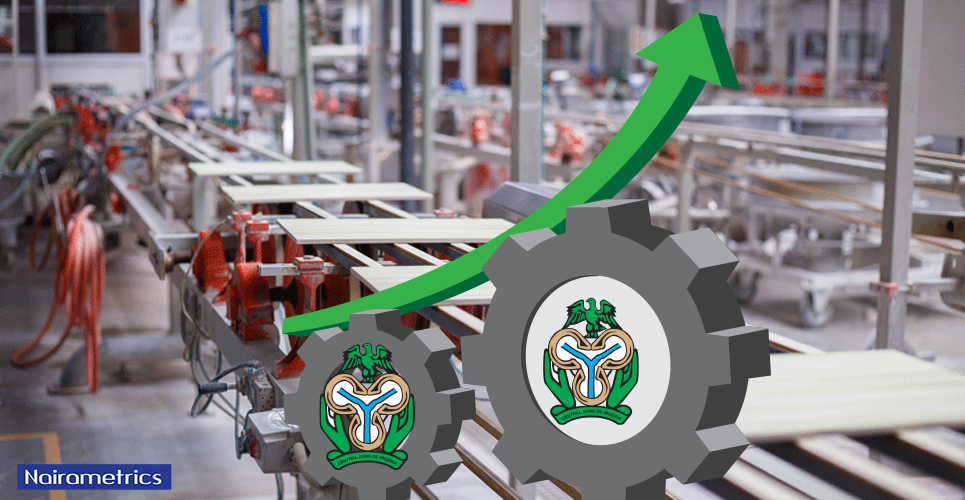Article summary
- CBN’s ban on 41 items, including vitrified and ceramic tiles, has propelled the local tile manufacturing market, taking market share from China-based tiles
- The rise in local tile manufacturing is driven by factors such as rising demand and limited access to forex to facilitate imports.
- The local tiles market is estimated to be worth more than N2 trillion and has taken over about 80% of the market share in Nigeria.
Rising demand and limited access to forex to facilitate imports are some of the factors driving the rise in local tile manufacturing. This is according to market research conducted by Nairametrics.
Some industry experts who spoke to Nairametrics opined that the country is no longer wholly dependent on imports to meet local demand for tiles. That’s because the product is currently being manufactured locally at a scale and quality good enough to meet local demands.
Understanding the CBN policy that underpinned the growth
To better understand the astronomical growth witnessed in the local tile manufacturing market, one will have to trace back to a series of interconnected events starting in 2015.
In 2015, the Central Bank of Nigeria introduced a policy which listed 41 items that were rendered invalid for foreign exchange at the official foreign exchange market. Included in the list were tiles – vitrified and ceramic. The item was number 34 on the list. Other items were wooden doors, furniture, and related building materials.
The apex bank hinged its decision on the need to stimulate local manufacturing by curbing excessive demand for forex. The CBN followed this with a series of intervention funds that targeted key sectors of the economy such as power, manufacturing, aviation, and agriculture. It believed these measures would help revive the manufacturing sector, allowing Nigerians to produce more of what they consumed.
The initial impact of the CBN policy
The controversial decision to ban imports initially rocked local trade, especially for importers. It also triggered multiple exchange rate depreciation over the next 4 years.
The trade and real estate sectors fell into multiple recessions as limited access to forex meant entrepreneurs looked inward due to government policies. It is also important to bear in mind that building local capacities takes time to materialize and often produces outcomes far more expensive than foreign alternatives.
However, things turned the corner during the COVID-19 pandemic as trillions in government stimulus packages fueled growth across key sectors of the economy, including real estate.
Since 2020, Nigeria’s real estate market has witnessed positive growth every year, growing from about N8.9 trillion in 2019 to N10.2 trillion.
The impact of the COVID-19 pandemic
The COVID-19 pandemic also boosted the sector because property developers were able to access billions of naira from investors looking for relatively safe and stable returns. Consequently, developers devised quicker means of meeting construction timelines, some of which required turnkey-like orders for real estate materials such as tiles, furniture, and other woodwork.
Thus, local manufacturing firms who seized on the opportunity to set up local tile manufacturing plants were now in a better position to meet the demands of the sector rolling out quality, cost-effective wall, and floor tiles at a scale that is now helping them to compete with their foreign counterparts.
Findings by Nairametrics showed that there are now about eight major tile manufacturing companies in Nigeria, some of which include Goodwill Ceramic Nigeria Limited, Golden Crown Ceramic Tiles Nigeria Limited, Time Ceramics Nigeria Limited, Royal Ceramics Nigeria Limited, and Nispo Porcelain Limited.
Experts’ take on the rise of local tile manufacturing in Nigeria
Nairametrics spoke to some industry players to get better insight into the growth of the sector.
The Chairman of the Non-Metallic and Mineral sector of the Manufacturers Association of Nigeria (MAN), Mallinson Afam Ukatu, told us that the local tiles market is estimated to be worth more than N2 trillion and has taken over about 80% of the market share in Nigeria. Ukatu, who is also the Chief Executive Officer of Nispo Porcelain Limited,
noted that the need for home ownership is another major driver for the continued growth of the sector.
- “Because constructions are increasing and people’s interests in owning their own houses are growing, the local tiles industry has great prospects and potential if the government will give the much-needed support to the sector,” he said.
He further explained that another factor that has led to the increased adoption of locally made tiles is their conformity to Nigeria’s environment. He said:
- “The increasing patronage of local tiles has to do with conformity with our environment; some foreign tiles don’t conform to our system. According to a study on environmental factors affecting construction projects in Nigeria, humidity, rainfall, temperature, and wind can cause tiles to expand or contract leading to cracking or breaking over time.”
Ukatu also stated that the producers of locally made tiles have an advantage over imported tiles due to pricing, affordability, and quality. To compete, they operate in the middle tier where the price is relatively cheaper than higher quality tiles but good enough to be better than lower quality imported tiles.
- “Everybody wants to assess local tiles because importers now bring low-quality tiles into the country. The Chinese are producing low-quality and cheap products for export to Africa. Brazil and Spain produce high-quality tiles, but Nigerian importers go for second-grade. Asides from the high cost of imported tiles, Nigerian local tiles producers are meeting up with the demand for tiles in the country. They are coming up with products that are trending in the building market,” Ukatu said.
Good quality and good pricing
Mr Odom Chinonso, the Marketing Supervisor of Goodwill Ceramic Nigeria Limited, also told Nairametrics that due to the precarious economic situation in the country, many people are increasingly buying more local tiles because they are affordable and can serve almost the same purpose as the imported products.
Our survey suggested that the price of a 60 by 60 granite floor tile range from N3,300 – N3900 per carton. This compares to foreign imported tiles that can sell for as high as N10,000 per carton for high-quality Spanish or Italian tiles. Do note that tiles are also sold in several other dimensions.
At Mushin Market, we spoke to Mr Lanre Omotosho, a tile distributor. He told us that local tiles are selling more than foreign products in the country because they have good qualities and are cost-effective. Omotosho said Nigerians are shying away from foreign tiles because they are expensive due to foreign exchange involved in bringing them into the country and high duty payments at the nation’s ports.
Property developers’ perspectives
The choice of locally made tiles is also easier for developers due to the scale and size of their projects and the need to reduce cost escalations and delivery timelines. As one developer who spoke to Nairametrics explained, most homeowners hardly bother about the difference between local and foreign tiles because some of the projects are for rental or short-lease apartments. Since they are more time and cost-sensitive, it makes commercial sense for developers to go for cheaper local tiles.
Nairametrics also spoke with Blessing Obomovo, the Managing Director of Standout Property Limited, a leading residential property development company. While speaking on why Nigerians are patronizing locally made titles, he said:
- “The quality of what we are buying from China before is the same quality that is being produced locally in Nigeria. It only gives options for people who cannot afford Spanish or Italian tiles. As an option, those who don’t have money to go for the Italian or Spanish tiles patronize locally made tiles.”
According to Blessing, some people are “just struggling to get their houses finished and have a roof over their heads,” making the type of tiles the least of their challenges.
While cost is a major motivation for the selection of tiles, the quality of development also determines what he goes for. For example, luxury home builders still prefer to use foreign-made tiles from China and Spain leaving developers with no choice but to follow suit.
- “When we use to go to Orile to buy Chinese tiles instead of Spanish tiles, It is because of the cost. There are differences between Spanish or Italian tiles and Chines local tiles, I know the kind of development I will do that I will not use Chinese tiles or local tiles,” he said.
On whether homeowners are happy with locally made tiles, Blessing responded that they were content when they compare the value received with the amount paid. For example, a homeowner looking to purchase a one-bedroom apartment with an N30-N40 million budget understands they need to g for affordable tiles. He said:
- “There is no way, you will buy an N30 million house and expect to have tiles worth N5 million inside the house.
- “The locally made tiles are still the same quality as five years ago, they are still China’s type of tiles, I have not seen any difference since the past years.
- “The current price is justified and a reflection of the economic situation, what do you expect, if we are buying diesel at N8.10 per litter as against when we were buying it at N1.50 per litter, certainly prices will change, the situation is affecting everything including the tiles. That’s the current reality.”
Ironically, the Chinese have investments in six of the eight ceramic tile-making companies in Nigeria while Indians have investments in two others. This is according to a Professor of Ceramics Engineering, Patrick Oaik-hinan, who gave the figure on the sideline of the launch of Oaikhinan Ceramics Foundation in Lagos 3 years ago.
But there are challenges
Despite the gains experienced in the sector, they still faced mounting challenges to factors of production such as the high cost of energy, human capital, double taxation, and bad road networks which affects product distribution.
Ukatu opines access to foreign exchange is also a major impediment as they still rely on the importation of raw materials and equipment to meet local manufacturing demand.
- “Forex is also a major challenge to source for spare parts and raw materials, but despite the challenges, and because we get some raw materials locally, tiles produced in Nigeria are still more affordable than foreign ones,” he said.
Chinonso noted that one of the industry’s major challenges is inflation which has also impacted pricing and forced some developers to either abandon projects or delay the delivery due to cost escalations. He said that the lack of basic infrastructure amidst several cost pressures has impeded the industry’s ability to produce at lower prices.
For example, in 2021 the cost of a 40 by 40 granite floor tile sole for as much as N1,900 however the same time now costs about N2,650 per carton. According to him, even though about 80% of the raw materials are sourced locally, the roads to the sites are in a deplorable state, while electricity is still a big challenge, contributing to the high cost of production which they also have to pass on to customers.
Chinonso also lamented that there are still no concrete policies to protect the local manufacturers, despite the forex restrictions.
- “If the economy improves, most of the uncompleted projects will be revived and that will bring more booms to the tiles industry and other producers of building materials. They should try to bring down the cost of forex and be taxation friendly; these will make the materials more affordable to enable people to build structures. The new government should also consider building structures like what they did in Festac town. This will bring booms to the tiles industry,” he said.
The global ceramic tiles market is driven by the growth in the construction industry, owing to the rapid expansion of the housing sector and the increase in construction spending globally. Urbanization and an increase in population are expected to fuel market growth. Thus, large-scale housing projects will fuel more demand for the sector, making it easy for local manufacturers to scale and spread costs.
In addition to government funding housing projects, growth in the construction of office spaces, shopping malls, lodging spaces, and other utility spaces across the globe is likely to increase the demand for the product across the globe over the years.
























